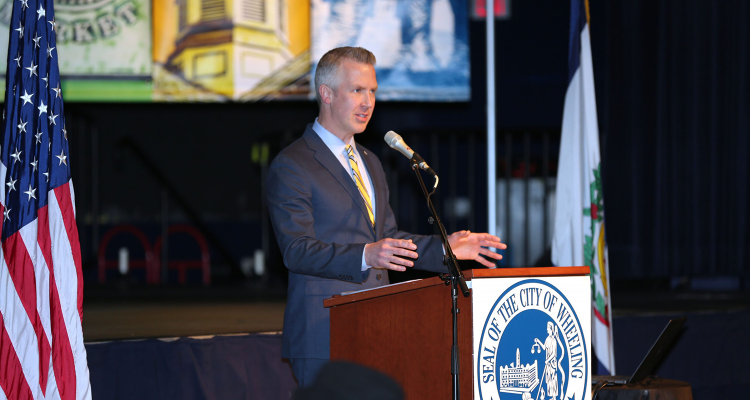Editor’s note: Mayor Glenn Elliott presented the State of the City Address today, Feb. 25, 2020, at Wheeling Island Hotel-Racetrack-Casino Showroom before an audience of hundreds. Here are the prepared remarks provided by his office. Or, you can listen to his speech here.
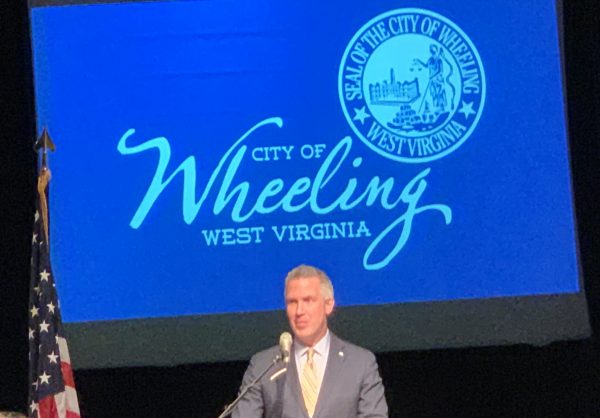 Let me begin by thanking the people who made this event possible.
Let me begin by thanking the people who made this event possible.
Thank you to the City of Wheeling Police and Fire Honor Guard for presenting our national, state and city flags.
Thank you, Pastor Chris Figaretti, for leading today’s invocation.
Thank you as well to my fellow members of Wheeling City Council: Vice Mayor Chad Thalman, Ken Imer, Melinda Koslik, Wendy Scatterday, Ty Thorngate and Dave Palmer. Too often in City affairs does the Mayor get a disproportionate amount of the credit or blame for Council decisions. Those who know, know that any City Council is only as good as the people who comprise it. It remains an honor for me to serve the citizens of Wheeling with each of you.
Thank you as well to City Manager Bob Herron, Assistant City Manager Bill Lanham as well as the following department heads who keep our City running every day:
• City Clerk BJ Delbert
• Finance Director Seth McIntyre
• Public Works Director Rusty Jebbia
• Economic Development Director Nancy Prager
• Police Chief Shawn Schwertfeger
• Fire Chief Larry Helms
• Human Resources Director Tessia Haymaker
• Parks and Recreations Director Jesse Mestrovic
• City Solicitor Rose Humway-Warmuth
• and all other City staff members who are here today, including Michele Rejonis, our marketing and community relations specialist.
PAST: GATEWAY AWARD
For the last three years on this occasion, I have begun by looking back to prior decades of City history. The purposes are twofold. First, I believe that better understanding our past lets us put our present circumstances in a richer context. But also, I believe it is important to pay tribute to those individuals whose contributions underlie many of our present advantages.
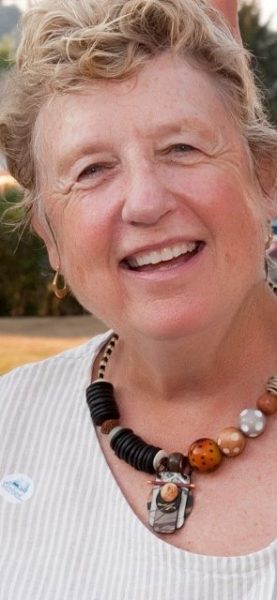
And so today, it is with much appreciation and respect that I bestow the City’s fourth annual Gateway Award upon someone whose efforts from the early 1980s well into the 2000s made Wheeling a better place to live, work and play. I am, of course, talking about Hydie Friend.
It is no exaggeration to say that if you look at Wheeling today, you will find Hydie’s fingerprints everywhere. She was at the frontline of the City’s early efforts to use historic preservation as an economic development tool. From her position in the City’s Department of Development in the 1980s, she spearheaded the renovation of the historic Market Houses in Centre Market — public investments that to this day continue to spur private investment in the surrounding commercial properties and residences. Hydie was also at the forefront of the City’s efforts to develop its bike trails and the Veterans Memorial Amphitheater.
In 2002, Hydie became executive director of the Wheeling National Heritage Area Corporation, serving in that role until 2011. She set in motion a series of events that led to the City of Wheeling’s official designation as a National Heritage Area by the United States Congress. She guided and managed the funding, design, construction and operation of Wheeling Heritage Port. She was at the forefront of the effort to save and rehabilitate one of our City’s greatest treasures, the historic Capitol Theatre.
She worked behind the scenes to secure federal and state tax credits for several local historic rehabilitation projects, including the Wheeling Stamping Building, which today houses Orrick and the Stone Center, which today is home to more employees than any other building Downtown.
I could go on and on about Hydie’s many contributions, but let’s just pause for a moment and imagine Wheeling today without a Centre Market or Heritage Port or a Capital Theatre or bike trails or any of these other community assets that she spent her professional life working for here in the Friendly City.
With a “we can do it” attitude, a smile and a lot of determination, Hydie Friend helped make Wheeling a better place to be. And she did it all with humility. So much so that when we reached out to her to inform her about this award, her initial response was to decline. Not because she wasn’t appreciative of the gesture, but because she felt she wasn’t deserving of special recognition. Her exact words to us in an email were:
I like to think that I laid a good foundation, but I don’t need to be singled out. I had many partners — Don Rigby, Craig O’Leary, Dave Klug, Bob Herron, Nancy Prager, Denny Magruder, Frank O’Brien and more.
Needless to say, we asked her to reconsider. And we noted that it is precisely because of her unwillingness to accept this recognition that made her the perfect recipient of the City’s 4th annual Gateway Award. Ladies and gentlemen, please join me in thanking Hydie Friend for her years of thoughtful and meaningful service to our community.
COMMUNITY SPIRIT AWARD
Let us fast forward to the almost present — specifically, 2019. In some respects, it was a challenging year for our community with a hospital closure and some painful transitions by cherished local institutions. I will have more to say about our 2019 challenges later, but for now, I would like to turn our attention towards something remarkable that happened.
For the better part of the entire year, the City played host to a multitude of events, programs and activities centered around commemorating Wheeling’s 250th anniversary. This collective effort was the result of nearly a year of planning by the Wheeling 250 Committee, which was appointed by City Council in early 2018. This committee consisted of more than 30 talented, diverse and passionate stakeholders, representing a broad spectrum of organizations and affiliations in our community.
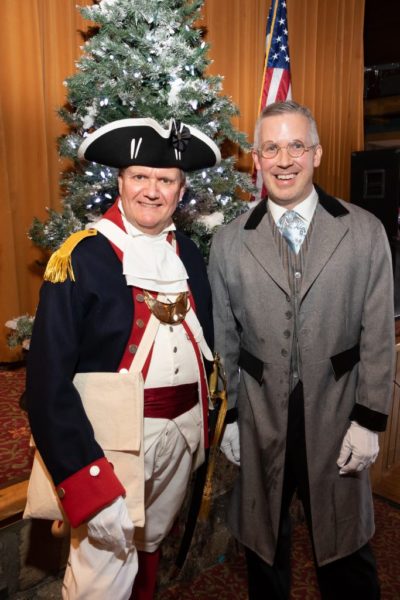
Let’s start with the four Wheeling 250 subcommittee chairs who stepped up in organizing these events, programs and activities. Erin Rothenbuehler, Jeanne Finstein, Olivia Litman and Travis Henline, each of whom I believe is with us today. Please join me in thanking these volunteers for their efforts.
And then let’s turn to the individual who made it his personal mission for Wheeling 250 to out-do in every conceivable way the citywide celebrations that had taken place in 1969 for our bicentennial. Yes, I am referring to Wheeling 250 Committee Chairman Jay Frey.
Having served on several boards with Jay, I knew that he was a conscientious and thoughtful person who took his responsibilities seriously. And I knew that he was someone with a very deep and very rich appreciation of Wheeling history. But not even I could have foreseen what a force of nature Jay would be in making our City’s 250th anniversary celebrations the blueprint for how a City can thoroughly and holistically observe such a milestone.
From the first committee meeting in February 2018 through last week, when he issued a final report to City Council, Jay Frey was Mr. Wheeling 250. And he never failed to deliver. When he suggested commissioning a new City flag to replace a 1960s version that had fallen into obscurity, I had my doubts. And yet before you here today stands the beautiful new City flag adopted by City Council in September 2018. It was designed by Erin Rothenbuehler from historic milestones developed by Sean Duffy, Travis Henline and Mr. Frey himself.
When he said he wanted to kick off 2019 with a costume ball to raise funding for the overall Wheeling 250 initiative, I was at first skeptical. And yet in early January of 2019, the committee hosted a sell-out costume ball with over 220 guests and a profit of $4,000. When he said he wanted to bring the WVU Marching Band to Wheeling for a grand parade through Downtown, I said to myself, “Good luck, Jay.” And then on September 7 of last year, we had a grand parade that included the United States Army Old Guard Fife and Drum Corps (the Official Ceremonial Unit and Escort to the President of the United States), countless federal, state, and local elected officials and organizations, WVU President Gordon Gee and, of course, the WVU Marching Band. You can probably guess what happened when Jay suggested having a Gateway Clipper river cruise and fireworks event at Heritage Port.
While he had a lot of help from a lot of terrific people and organizations, the fact of the matter is that Jay Frey got things done. And he did so without ever breaking a sweat or otherwise betraying his gentlemanly demeanor.
Each year at this address, through the Community Spirit Award, we recognize a local citizen whose contributions have embodied civic engagement and helped bring pride to our community through service, generosity and general love of Wheeling.
I can think of nobody more deserving of this award this year. Please join me in congratulating the 2020 recipient of the Community Spirit Award, Jay Frey.
PRESENT DAY
Which brings us to 2020 and, well, the State of the City. In prior years, I have used this address to highlight specific policy and funding priorities of City Council. But today I would like to focus on a topic that is perhaps more on point: How does one measure the actual state of a city?
A common metric is the local economy, and we will talk about some very good news in that regard today. Another measure of any city is the people and organizations who comprise it. And as you will see in our various honorees today, we are very, very fortunate in that regard. But the state of any city is also measured by the collective feelings we all have about its future. And in this regard it is fair to say that that as a community we have divided opinions ranging from ‘the sky is falling’ to ‘the sky is the limit.’ So much so that it brings to mind the famous Dickens line “it was the best of times, it was the worst of times.” In Wheeling, it all depends on whom you ask.
So let us start with the local economy. Full economic numbers always lag behind real time, but one strong indicator of a city’s current economic condition can be found in its ongoing tax and fee receipts.
At last week’s Council meeting, City Manager Bob Herron presented a report on the first seven months of our current fiscal year, which began in July 2019. Compared to the same period last year, we saw considerable increases in revenues from the City’s B&O tax collection, sales tax collection and building permit fees. So much so that those in attendance noted that Mr. Herron’s usually stoic countenance at such meetings almost gave way to a smile. Almost.
As further evidence of a strengthening local economy, the Wheeling metropolitan area was recently recognized by Bloomberg News as No. 5 in the nation for per capita personal income growth over the prior three years (at a remarkable rate of 8.9 percent). Let me repeat that for those who perhaps misheard me: Fifth in the nation in per capita personal income growth since 2016.
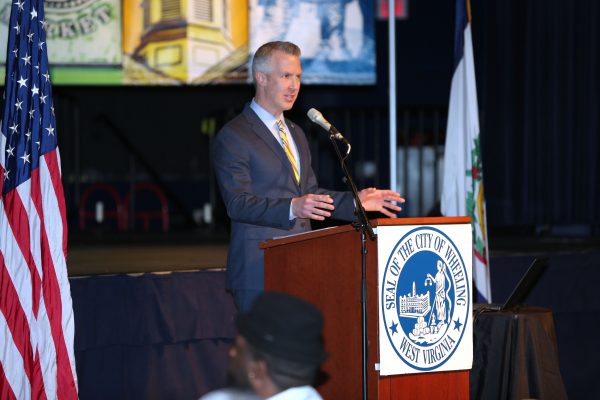
Likewise, while unemployment statistics lag in their compilation, the evidence is clear that we do not suffer from a lack of available jobs in this community. I talk to local business owners regularly. Many are trying to grow their workforce, but all are facing a common problem: The lack of qualified people to fill the positions they have.
This is exactly the opposite problem Wheeling had when I graduated from high school three decades ago and saw few viable job opportunities. Today, the jobs are here. Lots of good-paying jobs in different fields. But for too many years we have allowed the young professionals and skilled workers who could fill these jobs to leave seeking greener pastures elsewhere.
It turns out that to compete in the 21st Century, cities must not only have a surplus of job opportunities, but they must also meet the quality-of-life expectations of tomorrow’s workforce. This City Council, to its credit, has recognized this new reality. We have made great strides improving our network of city parks, playgrounds and trails. We have emphasized the need for adding more market-rate housing units in the vacant floors of Downtown buildings. We helped bring Uber and Lyft to Wheeling. We expanded housing and employment discrimination protections to include sexual orientation, gender identity and veteran status. We have worked with City partners to expand the menu of events at WesBanco Arena and our waterfront. And we have taken steps to improve the look and functionality of our Downtown streetscape to restore its status as a destination location. We even authorized food trucks to conduct business on public streets. But that’s a topic for another day . . .
Reasonable minds can disagree on one or more of these priorities. But for those of you whose children or grandchildren have left our community in recent years, take a close look at where they went. Chances are it is an inclusive city with loft apartments, a vibrant downtown, a robust parks and recreation system and, yes, food trucks. The evidence is clear: Younger workers are choosing where they want to live first and where they want to work second. And cities that do not focus on quality-of-life issues are being left behind.
Another exciting aspect of our current economy is that is has provided room for success in businesses old and new, as today’s next two honorees demonstrate.
It was 1920 when an entrepreneur named Lou Nau opened a hardware and plumbing store at the corner of Edgington Lane and National Road. When Lou retired, it was his son Richard who took over. Today, it is Richard’s son Jeff who serves as President of the company. The family tradition is continuing as Jeff’s children — Justin and Heather — work in the business as well. For many decades now, Lou W. Nau, Inc. has offered plumbing, bathrooms, kitchens, heating and cooling services along with friendly, knowledgeable advice to customers. In an era where supersized home improvement stores may be in vogue, Lou Nau has demonstrated that providing reliable service with a personal touch can still offer a competitive edge. On this 100th anniversary year of this third-generation family business, please join me in congratulating Lou W. Nau, Inc. for its continued success.
Let’s now turn our attention to one of the City’s newest endeavors, Grow Ohio Valley’s Public Market in Downtown Wheeling. For nearly a decade leading up to 2018, a narrow space on the Main Street side of the Intermodal Center that used to be Greyhound terminal sat vacant. Two years ago, Grow OV approached the City with the idea of converting this unutilized space into a year-round, non-profit farmers market that would bring local and natural food to Downtown Wheeling. The skeptics were out in full force to challenge this idea and jokes about seaweed, tofu, and hipsters flooded our local discourse and its airwaves for months. [Anyone see Howard Monroe here today?] But Grow OV did not flinch. They kept their head down and kept moving forward. And hosted the grand opening of a spectacular new addition to Downtown Wheeling last Fall. To me, what’s so significant about the Public Market is not its appeal to the so-called “hipsters” in our community. That was a given. But what has been so remarkable about the Public Market is its appeal across all age groups in our community. It turns out that people of all ages appreciate locally grown, healthy foods. Please join me in congratulating Grow Ohio Valley for thinking outside the box in making the Public Market a successful reality.
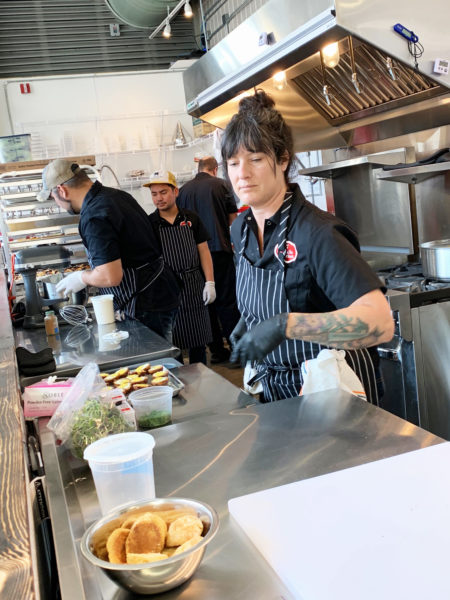
I mentioned earlier how important retaining younger workers is for cities competing in the 21st Century. Equally important is attracting people here who were born elsewhere. Neither of our next two honorees was born in Wheeling, but both found their way here and decided to stay. And our community is the better for it.
Let’s start with Dr. Jeanne Finstein, who hails from St. Albans, West Virginia. You may know of her today as the face of Friends of Wheeling, a longstanding local nonprofit committed to historic preservation. But those who know Jeanne know that her involvement in our community runs deep. With advanced degrees in mathematics education, she has used the classroom to expand the minds of countless area youths. Indeed, to this day, she does volunteer math tutoring at Elm Grove Elementary School. In 1990, she co-founded the NASA Classroom of the Future at (then) Wheeling College, and she worked on curriculum development software for NASA and the U.S. Department of Education. She has co-authored and edited books on Wheeling and its history. She also currently serves as Chairperson of the Board of Wheeling Heritage and, as noted earlier, was a Wheeling 250 subcommittee co-chair.
But back to Friends of Wheeling. Convinced that the preservation community had taken too passive of a role while many historic buildings were facing demolition, she felt it was time for a more proactive approach. And in 2015, along with previously mentioned honoree Jay Frey, Jeanne helped create a Preservation Loan Guarantee Program that provides prime-interest-rate loan guarantees for those rehabbing historic Wheeling properties. This fund now stands at more than $300,000, with 13 properties having received assistance and many more to come. Please join me in congratulating Dr. Jeanne Finstein for her decades of service and contributions to her adopted home of the City of Wheeling.
Our next honoree is not with us today because he left this world in September 2019. But it is safe to say that the legacy he left behind continues to resonate. Jim Bordas grew up in Charleston, West Virginia, but he eventually found his way to Wheeling, where he began his career as a plaintiffs’ lawyer in 1972. In 1985, he founded Bordas & Bordas in Wheeling with his wife, Linda. Throughout the years, both Jim and his cases would often receive national recognition, including a segment on ‘60 Minutes’ and widespread coverage of landmark cases against a major automobile manufacturer and a large nursing home provider. But it is Jim’s contributions to his adopted community of Wheeling that I would like to highlight today.
Throughout his successful legal career, Jim made a point to give back to his local community. His philanthropy and support of local organizations was recognized by Youth Services System with its 2014 Good Samaritan award. His law firm received the Governor’s Service Award and was also named Pro Bono Firm of the Year. And in 2016, both Jim and his wife Linda were honored with the YMCA Light of Valley award.
I only had the opportunity to sit down with Jim once, prior to his receiving a dire health care diagnosis. He invited me to lunch at his favorite spot: Mehlmans, in St. Clairsville. It was one of the more interesting lunchtime conversations I have had, and he stressed how he wanted to help the City in its efforts to beautify its gateways. He emphasized that any city only has one opportunity to make a first impression on visitors, and he said he very much wanted to be part of the solution. I had no idea after that lunch meeting that this would be the last time I would see Jim Bordas. But I have not forgotten his call to action. Jamie and Ben Bordas are here today in honor of their father. Please join me in celebrating the contributions of the late Jim Bordas to his adopted city of Wheeling.
OK, so we are still working through our analysis of the state of this city. We have seen positive economic indicators, including higher tax revenues, low unemployment and strong per capita income growth. And we have heard of the success of businesses old and new, not to mention the contributions of people who chose Wheeling over their own hometowns. But part of what makes Wheeling such a wonderful place to live is much more difficult to measure. It is found in the willingness of people and organizations to advocate for those who may not always be heard. Our next four honorees exemplify these qualities and help add to the richness of our local culture.
Youth Services System (YSS) has made a positive difference in this city and region since 1974 by focusing first and foremost on the needs of the children, families and adults it serves. For decades, YSS has operated a Samaritan House emergency shelter in Wheeling committed to actively loving the ‘least favored’ in our society. Since taking over as CEO in 2003, John Moses has adopted a motto of saying “yes.” In 2009, YSS said “yes” to a Freeze Shelter that has over the past decade served more than 1,500 people. In 2017, YSS said “yes” to continuing the work of the Lazarus House and Mary & Martha Houses — sober living homes for those in recovery. The following year, YSS said “yes” to the Youth Mentoring Network. And when asked by the State to create a substance abuse treatment program for juvenile girls, YSS said “yes” to a program that is poised to open this Spring following an $850,000 retrofit construction project at the Juvenile Center on Chapline Street. It is difficult to quantify the contributions an organization like YSS has made to our community over its 46 years. But trying to do so misses the point. Through the prism of history, any society is invariably judged by the plight of its least favored citizens. Thanks to the tireless efforts of John Moses and YSS, my hope is that future members of a Wheeling 300 Committee will look more favorably upon the Wheeling of today. Ladies and gentlemen, please join me in honoring the tireless efforts of Youth Services System in saying “yes” to a brighter future for our community.
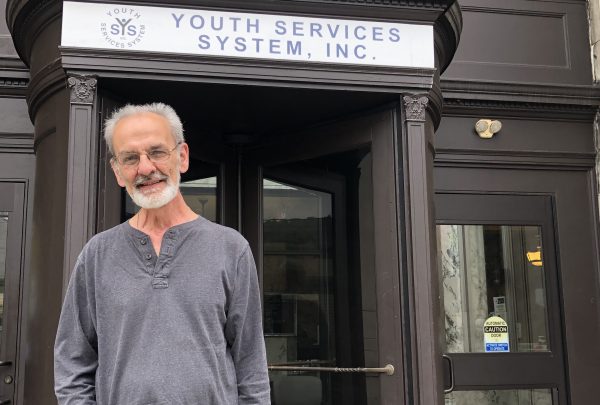
Like YSS, our next honoree strives to give a voice to those who might otherwise be left behind. There was a time when families of children with autism in the Ohio Valley had to look elsewhere to find help. Then in 2005, Kathy Shapell founded the Augusta Levy Learning Center as the first evidence-based autism treatment program in West Virginia that used proven methods to give children on the autism spectrum the best opportunities for success. If you have any doubt of what this organization means to our community, just spend five minutes with the parent of an enrolled child. And try to contain your emotions. Simply put, Augusta Levy has given families confronted with autism real hope. It has provided opportunities for children facing a life shut off from mainstream society. And it has done so despite suffering a major setback in 2018 when losing its headquarters to a fire. As we gather here today, work proceeds on the construction of a new Fortress for Heroes Building in Woodsdale that is scheduled to be completed by July of this year. This new state-of-the-art center will give August Levy greater opportunities to provide more services to children with autism and their families. It will host many classrooms and an ADA-compliant playground that will be accessible to all children in the community. And it will create new jobs in the City of Wheeling. Please join me in congratulating Augusta Levy Learning Center on its unwavering efforts to counteract the effects of autism in the greater Wheeling community.
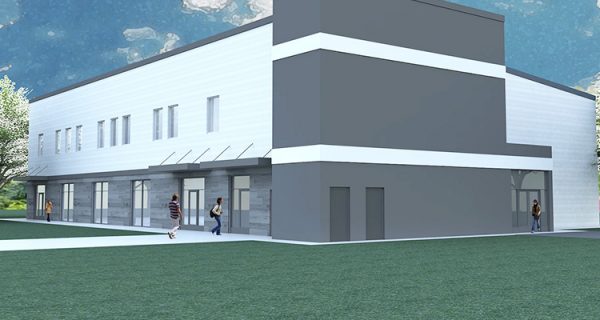
Our next honoree today needs no introduction to many of you. Ron Scott Jr. is a lifelong Wheeling resident who currently serves as Cultural Diversity & Community Outreach Director for the Wheeling YWCA. Early in his career, Ron spent 13 years as a counselor in the field of addictions at several area institutions, including Wheeling Park High School and another of today’s honorees, YSS. Ron’s dedication to his community and his commitment to advocating for justice has led him to a variety of positions, including former President of the Upper Ohio Valley NAACP, former Vice Chairman of the Wheeling Human Rights Commission, founder of the Ohio Valley African American Students Association and Chairman of the Performing Arts Committee of the Wheeling Arts & Culture Commission. And Ron’s creative side is often on display in the local arts and music scene. But to me, what makes Ron special is his willingness to initiate uncomfortable conversations, and to do so with grace and without malice.
The first time Ron and I had an extended conversation was during my campaign for this office in 2015. We realized we were close in age and had both grown up in Wheeling around the same time in comparable economic conditions. But our perceptions of our childhoods differed greatly, and the more we talked, the more it became clear that our respective skin colors had a lot to do with this. To this day, I have never had an extended interaction with Ron that has not expanded my own understanding of our community. And I look forward to his conversations for years to come. Please join me in thanking Ron Scott Jr. for his tireless efforts to enrich the culture of our community.
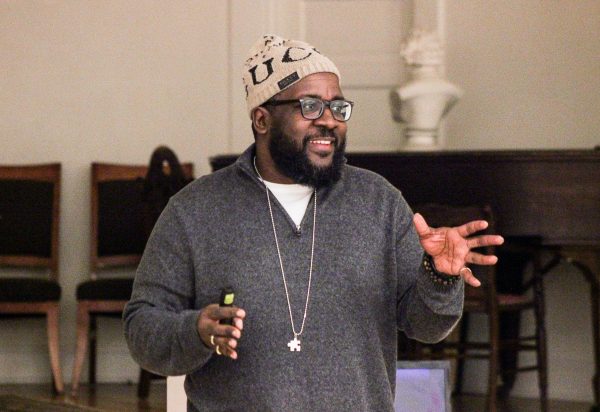
Our last of today’s honorees is Gail “Boatsie” VanVranken. When her son Patrick joined the Air Force in 1989, he remarked to his parents that enlisted troops abroad often find themselves in need of basics and small treats — things like candy, socks, DVDs and shaving cream. “Boatsie” and her husband, Jim, began their Boatsie’s Boxes project, which quickly became a national campaign, to fill that need by sending our troops boxes, then Christmas stockings, filled with these frequently requested items. Over the years, Boatsie’s Boxes Christmas-season campaign benefited tens of thousands of servicemen and women at posts abroad — with volunteers participating from all 50 states. This wonderful initiative came to an end in recent years when “Boatsie” and Jim decided it was time for them to retire. But their efforts have not been forgotten and today deserve our recognition. Ladies and gentlemen, please join me in thanking Gail “Boatsie” Van Vranken for her many years spent enriching the lives of those in service to our country.
I said earlier that one measure of the state of a city is the people and organizations who comprise it. How about a round of applause for all of today’s honorees for their countless contributions to our City?
Which brings me to my third metric for assessing the state of a city: how its citizens feel about its future. In our City, it would seem that this is a topic upon which not only a consensus is lacking but also where a great disparity of opinions can be found.
On the pessimistic end of the spectrum, you have those who believe that our City’s best days came decades ago and our efforts today amount to little more than reshuffling the deck chairs on the Titanic. They see dilapidated buildings. They see an opioid epidemic that seems to be getting worse. They cannot discuss Downtown without reminding you how amazing it used to be. They see the closing of OVMC as a harbinger of dark times ahead. They decry the condition of our state roads and current traffic detours. And the only thing that seems to bother them more than any of this is the notion of their City government spending their tax dollars to try to fix any of it. If the ship is sinking, after all …
On the flip side, you have those who downplay these various challenges and see Wheeling’s best days as yet to come. If you dare criticize Downtown, they almost reflexively point out the (true) fact that more people are working Downtown than at any point in its history. They point to the dozen or so new restaurants that have opened in and around Downtown since 2016 as evidence of a coming renaissance. They see the job openings at multiple businesses throughout our community, not to mention the hundreds of new positions filled by displaced OVMC employees. They see a small town with many big-city benefits, including now two professional sports teams, an elite symphony, a world-class waterfront, the Oglebay park system and a favorable geographic position. They laud the resurgence in entrepreneurism seen in new business start-ups across our community. They see the enormous public works projects taking place on our Interstate as a necessary inconvenience along the way to a transformed local highway system. And they point to the many people and organizations like the ones recognized today doing good and meaningful work.
Now to be fair, many of you in this room probably fall somewhere between these two ends of the spectrum. But as is often the case in human affairs, those with moderate views tend to be far less vocal and convinced of their beliefs than those on the extremes. Make the mistake of tuning into any online debate about any City topic large or small, and you will see an epic clash of Wheeling’s diehard optimists and dedicated pessimists unfolding in real time before your eyes.
Which brings me back to my dilemma. If the third leg of my state-of-the-city stool is predicated on there being some consensus about our future, how can I make sense of the total absence thereof? This is, to be sure, an elusive quest.
But one perspective that I have found to be helpful is that of people who do not live in Wheeling but who visit from time to time. We all have friends and family who meet this criteria. And in my position, it is not uncommon for me to get emails, letters and phone calls from Wheeling visitors sharing their unsolicited views on all things Wheeling. In my personal experience, there is an unmistakable consensus among these people that Wheeling is a City on the rise.
Does this mean the pessimists are wrong? Of course not. Feelings about the future are inherently subjective. For what it’s worth, while I personally side with the optimists, I do not believe the pessimists are necessarily wrong. We each sometimes see what we want to see through the prism of our own experiences. If you have stepped out your front door for the past ten years and seen the same dilapidated house across the street getting worse, that experience is going to color your impression of Wheeling at large.
And so where does this leave us? Are we experiencing a Dickensian winter of despair? Or instead a spring hope? I suppose it all depends on whom you ask. But because I am standing before you today with a microphone, I am going to state for the record that I believe the future of Wheeling looks very bright. And that the State of our City is indeed very strong.
Now, I have some good news and some bad news.
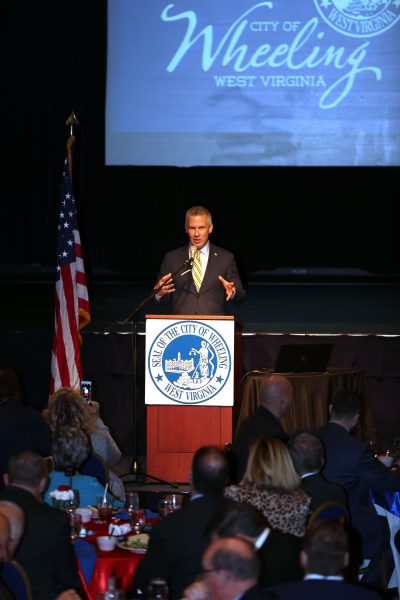
The good news is that I have come to the end of what I initially intended to be my remarks today.
The bad news is that I woke up Sunday morning and, as I often do, opened the pages of the Wheeling News-Register with some trepidation. As Vice Mayor Thalman and Councilman Palmer can attest, once you have been cartooned on said pages, this unease is inescapable. But on this Sunday, while I found no cartoon, I did find a homework assignment from editor Mike Myer telling me what topics this address must cover. And here I am with my speech all but wrapped up and I have barely touched on any of them.
So here is my proposition: If you give me your attention for five more minutes, I will complete said assignment to the best of my abilities and let you go about your day. Here goes:
Let’s start with the status of our proposal to build a new Public Safety Building at 19th and Jacob Streets. The short answer is that little has changed since we entered into an option agreement to purchase the 3.5 acre parcel in question. We are waiting both for the final results from a full Phase II ESA Report on the property and to see if the City is successful in its request for $1 million in federal Brownfields assistance before we make our final decision.
On this topic let me emphasize two points:
First, from Day 1 of our Public Safety Building discussions, we have relied on City staff, including our police and fire chiefs, to identify and rank qualifying sites. The consensus best site they identified was the original 10th and Market Streets location. The consensus second-best site is at 19th and Jacob Streets. While not as centrally located as the original site, it has a much larger footprint that allows for a one-story building and cuts roughly $6 million off the project cost.
Second, it has been suggested by critics of this proposal that putting a new facility on such a Brownfield site would compromise the safety of our police and firefighters. This is simply untrue. The whole point of our investigating abatement of this site is to make it safe. Nobody on this City Council would ever contemplate putting our first responders at risk at a contaminated site that has not been fully abated. To the contrary, it is the deplorable condition of our existing first-responder facilities that has driven this initiative since its inception.
With respect to the proposed parking structure to support the redevelopment of the Wheeling-Pittsburgh Steel Building, we continue to wait for the developer to finalize the project plans and financing. We have explored the possibility of erecting a parking structure of approximately 300 spaces on the site of the former Chase Bank Building and lot at 11th and Market Streets. This would be large enough to handle the increased demand from tenants of the Wheeling Pitt building, as well as the increased workforce expected in the Stone Center over the next few years.
Of this project, please note the following:
First, unlike many City projects, a parking structure would generate revenue that would cover a significant portion of its debt service. The spaces provided to Wheeling Pitt tenants and others would be paid for at market rates.
Second, if the Wheeling Pitt project happens, it would be the largest investment in the history of Downtown Wheeling — roughly the same size as the investments in the Health Plan and Boury Lofts combined. It is important not to underestimate the effect that saving Downtown’s only skyscraper with that size of an investment could have on the local economy.
Finally, let me briefly discuss the Downtown Streetscape project, now some five years in the making. As has been reported, this project has grown in scope and size from $8.7 million to now roughly $25 million. But contrary to what you may have heard, these increases are not being driven by any City decisions. Instead, the project is simply far more complicated than originally conceived. Underground vaults, engineering issues relating to ADA compliance, State decisions to include new traffic signalization and to require storm-sewer separation — these are just a sampling of the factors driving up the costs. But there is light at the end of Wheeling Tunnel. We have been working diligently with State officials to secure funding for the balance of this project, and our understanding is that an announcement will be forthcoming in March. When this project is completed, it will be the most significant facelift for Downtown Wheeling since 1980. Stay tuned.
Ladies and gentlemen, you have been a most gracious audience today, and I thank you for bearing with me as I have run over my allotted time.
Please be safe as you go about your day. Thank you.


